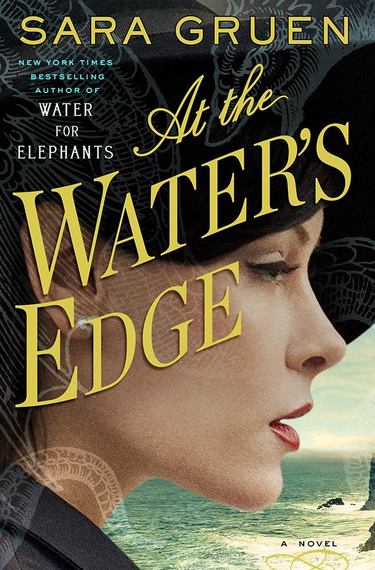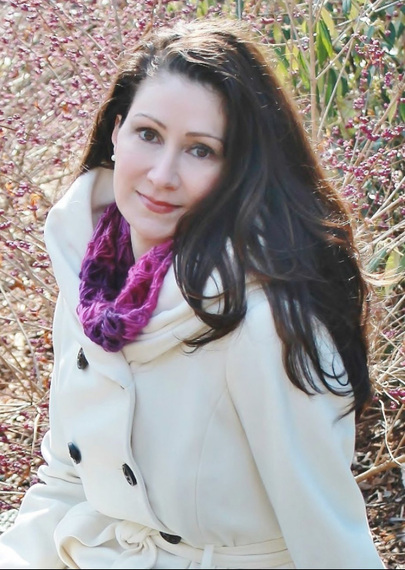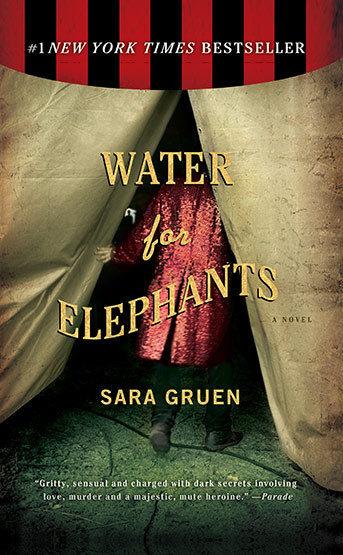Sara Gruen author of the new release, AT THE WATER'S EDGE, shared some insight into her writing process and what lead her to set her latest novel at the edge of Scotland's Loch Ness during World War II.
How did the story for AT THE WATER'S EDGE unfold for you? What drew you to writing it?
I had a long-standing fascination with the Loch Ness monster, starting when I was twelve and first visited Urquhart Castle and was convinced I was going to see it, and a random news article rekindled my interest. The idea of incorporating my favorite castle in the world with the looming prospect of the monster was irresistible, so I booked research trips without having any idea of what my story would be. Ultimately, it came to me in a rush when I was standing at the Water Gate in Urquhart Castle (a location that has great importance in the book), and I spent the rest of the afternoon stomping around the castle dictating ideas into my phone. That day was definitely one of the highlights of my writing life!
Both Jacob in WATER FOR ELEPHANTS and Maddie and Ellis in AT THE WATER'S EDGE suffer a sort of fall from grace at the start of stories, losing access to a once guaranteed future. What do your stories say about making life your own?
In the broadest sense, almost all stories begin with an upheaval of some sort, because normal people doing normal things does not a good story make! I think the stories that appeal to us as readers are those in which people have to examine what's really going on in their lives, or face a huge change in circumstances, and then see what they do going forward. In the case of AT THE WATER'S EDGE, Maddie and Ellis both face enormous changes in circumstance and their understanding of life as they know it, and react in nearly polar opposite ways to the truths they find.
What roles do travel and research play in your writing? When does imagination come in?
I love the research part. One of the best things about this job is that I get to find something that fascinates me and that I hope will be fascinating to others, and completely immerse myself in it for a few years. It happens different ways for different books, but in this case the location came first, and after a few weeks of full immersion in the Highlands, the story came to me. It happened while I was standing at the Water Gate, and all the little amorphous bits that were floating around in my brain started to take shape, so I sent my guide back to his car and spent the rest of the afternoon stomping around the castle dictating ideas into my phone. That's one of those writing moments you hope and dream will happen, but very rarely do. I still have the files on my phone. They're taking up a huge amount of space, but I can't bring myself to delete them.
Your books draw richly on the history of the times; in AT THE WATER'S EDGE, World War II frames the narrative. What do you think it takes to accurately portray a time period? How do you balance telling the story and setting the historical scene?
For me, I need to take an almost obsessive approach to research. When I'm at the writing stage, I pass through a kind of creative portal every day and feel like I'm really in that other world I've created, and so it has to exist right down to the trowel marks in the plaster, and I'm a stickler for detail. The saying "the devil is in the details" is absolutely right.
This is your fifth book; what have you learned about your writing process as you gained more experience? What stayed the same for you and what has changed?
I've realized that I can't structure my work time and progress quite as rigidly as I would like to. For my first couple of books, I aimed for (and got, even if it nearly killed me) 2000 words a day. Then I moved to 2000 words a day or eight hours, whichever came first. Now, I feel like if I show up for work and put in an honest day, I've done well. Because I can't force the creative process. Sometimes I am typing as fast as I can all day, and have to drag myself away because there's more to be done, and other times I stare glumly at my open file all day, which is okay, because I've come to realize that when I can't get any words out, it means there's something I need to figure out and change in the storyline and even if my fingers aren't busy, my brain is.
Out of all the character's you created, who is your favorite and why?
Before this book, I would have said Rosie, but now I have to say Maddie. She changed so dramatically from what I imagined her to be--coming to life in the way that characters do--and she was so willing to look at things that she had never examined before, in an open-minded and big-hearted way, and she showed courage and resolve in a situation that was utterly impossible, and became increasingly so.
I read that you needed an internet-free zone to write WATER FOR ELEPHANTS. Zadie Smith spoke about using a computer program to block herself from the internet while writing her novel NW. How do you keep yourself from going down the rabbit hole of cyberspace?
I wrote a large chunk of WATER FOR ELEPHANTS in a walk-in closet, because at that time we didn't have wi-fi and it prevented me from obsessively checking my email, shopping on eBay, and basically blowing an afternoon watching cats in boxes on Youtube. Then I used Zadie Smith's method--I know the program she's talking about--but I found a workaround, and so that ended up being no help at all. And just in case she ever reads this, I'm not going to say what that workaround is because I do not want to be singlehandedly responsible for the delay of a new Zadie Smith book.



